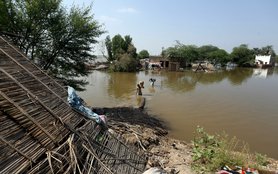At a time when some politicians are doubling down on oil and gas production, remembering the BP oil disaster underscores the urgency of ending our dependence on fossil fuels.
When the BP Deepwater Horizon oil rig exploded in the Gulf of Mexico 12 years ago, it caused stunning, and lasting, damage. On April 20, 2010, 11 workers lost their lives; and in the 87 days that followed–as oil gushed from the site–countless coastal ecosystems were destroyed, killing millions of wildlife and by one estimate, resulting in economic damages of up to $8.7 billion and 22,000 lost jobs in the fishing industry alone. As of 2020, BP had paid out $60 billion in penalties, claims, and cleanup costs.
This tragedy hit as communities along the Gulf Coast were still reeling from several hurricanes (including and especially Hurricane Katrina in 2005) that killed hundreds of people, destroyed homes and businesses, and decimated wetlands, fishing beds, and oyster reefs.
These disasters in the Gulf South, one after another, illustrate the havoc that the fossil fuel industry is wreaking on our world. For at least 50 years, oil and gas companies have known that their operations are driving climate change, yet have spent billions in campaigns and lobbying to delay meaningful action. Meanwhile, emissions drive severe weather events that devastate communities around the world, including disastrous storms like Hurricane Katrina; and fossil fuel company operations continue to pose dangers for people–workers and predominantly Black communities that live near infrastructure sites–wildlife, and the environment.
These companies have time and again prioritized profits over people, all while US taxpayers subsidize their operations, to the tune of $20 billion annually, and our elected government continues to greenlight these disastrous activities.
In the wake of the BP oil disaster, Oxfam America mobilized quickly in 2010 and the years that followed, in partnership with key organizations in the region such as Limitless Vistas, Inc, to support restoration efforts with technical and financial assistance. We also advocated for key policies to address the immediate needs of workers, communities, and the environment. In 2012, Oxfam pushed for passage of the RESTORE Act to redirect BP’s Clean Water Act fines back to restoring the Gulf.
In particular, Oxfam focused on the workforce that would be taking part in the coastal restoration projects, since we had seen problems with rebuilding jobs in the wake of Katrina. We organized to ensure that restoration investments provided local workers from disadvantaged communities with the skills needed to do these jobs, and encouraged contractors to hire workers from impacted communities.
We must fight to make sure such disasters never happen again
While the Deepwater Horizon disaster was the worst spill in US history, we still find that, 12 years later, fossil fuel extraction is as dirty and dangerous as ever. Further, recent IPCC reports show that each year we fail to confront our addiction to fossil fuels, we see the chances of a livable future dwindle.
Unfortunately, the Biden administration has recently backslid on their commitments to protect communities, promote environmental justice, and take bold action to combat the existential crisis of our generation: climate change.
During his campaign, President Biden promised to end new leasing for offshore drilling to stop allowing the fossil fuel industry to gamble with the health and safety of our communities, in addition to his pledges to stop drilling on public lands. Now, with elevated gas prices and action to combat the climate crisis stalled in Congress, the administration seems to be wavering, especially after the announcement of a new plan to encourage more fossil fuel production earlier this month and last Friday’s decision to resume onshore drilling on public lands.
But if history has taught us anything, it is that the solution to this pivotal moment is not to make it easier to drill and pollute-but to live up to Biden’s climate commitments, prevent future disasters, and expedite our transition away from fossil fuels.
We have the power to create a just and equitable green-energy future that prioritizes care of communities and workers over the pocketbooks of fossil fuel companies
We have the resources to build societies where everyone has what they need for full lives now and in the future: deep knowledge, and clean and renewable technology.
As the largest historical polluter, the US owes this to communities and future generations here in the US, and to the millions of vulnerable communities across the world who are already facing climate devastation even though they did little to cause the crisis.
Following the lead of our partners both in the Global South and in the US, Oxfam is calling on the Biden Administration to hold the fossil fuel industry to account, ensure that frontline communities have an influential seat at the decision-making table when it comes to our energy future, and enact just energy transition solutions that we can all be proud of.
_______________________________________
Take action: Sign the petition to hold the fossil fuel industry to account.


